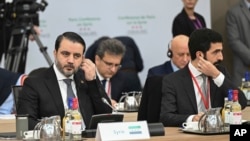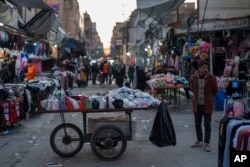Syria’s top diplomat says the country has gained freedom while managing to avoid another civil war, but observers point to major challenges ahead, such as the dire economy, uncertain security, and including Syria's diverse population in decision-making and governance.
Syrian Foreign Minister Asaad al-Shibani told the Munich Security Conference last weekend that the country’s new leadership will set in place a government that reflects the will of the people.
“The Syrian people freed themselves by themselves. We are now putting the steps and principles to have a system that represents the people to be Syrian-led and Syria-owned. The dictatorship will not be repeated again,” he said.
Al-Shibani said the country’s Islamist interim leaders want “to bring the whole Syrian society with us to prevent any actions that will break this stability and our achievement.”
Bassam Said Ishak is president of the Syriac National Council of Syria, based in northeast Syria and representing Syriac Christians.
He told VOA it is important for Christians and all minorities in a post-Assad government to be represented and respected.
Ishak spoke about a national dialogue conference scheduled for next month.
“My worry is that they wind up with a conference that it does not magnify the real voices of these diverse Syrians. That’s serious because this has been the traditional way. Assad did it this way. We just need a viable representation of everybody, whether it’s a Kurd, Syriac, Druze, Alawi, Ismaili. We just need to hear these voices. We need to hear people who are different, of different opinion and think of real solutions,” he said.
Syrian American lawyer Dima Moussa, who is a member of the Syrian National Coalition, an organization that promotes constitutional reforms, said the caretaker government is applying the Islamist principles it enforced when it ruled just Idlib province to the rest of the country.
She told the Washington-based Arab Center recently the interim leaders have “not yet completely come out of that mentality,” but she expressed optimism for the future.
“Inclusivity is probably one of the most important issues on the table today. And if it is not carefully and diligently worked on, especially at the national conference stage, it can set up for the reoccurrence and failure of many problems in the future. There have been some positive steps. They’re getting lost amid the hardships of the living conditions and some incidents in some of the more sensitive areas that historically had sectarian tensions which were amplified during the last 14 years,” said Moussa.
Some observers are concerned about a lack of clarity on how the new government will attempt to heal the still-divided country.
Questions remain over Syria’s future relations with Russia and Iran, and stalwart Assad supporters, as it pursues reintegration in the Arab fold.
Meanwhile, Syria’s economy is in tatters after nearly 14 years of civil war, widespread corruption under the Assad regime and sanctions by the West, including on its banking sector.
U.N. Special Envoy for Syria Geir Pedersen told the Munich Security Conference the Syrian interim government faces “enormous humanitarian challenges” as 17 million refugees and internally displaced people try to return home.
“They need to see there is a future in Syria, and they need to see it quickly,” Pedersen warned.





